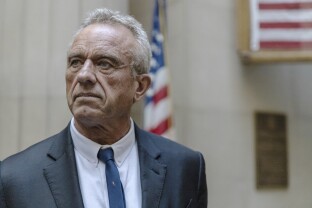Robert F. Kennedy Jr., the Department of Health and Human Services secretary, defended his decision to add anti-vaccine talking points to the Centers for Disease Control and Prevention’s website, telling The New York Times he was simply being “honest.”
“The whole thing about ‘vaccines have been tested and there’s been this determination made,’ is just a lie,” Kennedy said in an interview with the Times published Friday. “The phrase ‘Vaccines do not cause autism’ is not supported by science.”
During his confirmation process, Kennedy assured senators — including Sen. Bill Cassidy, a physician who chairs the Senate’s health committee — he would not remove the CDC’s website banner that says vaccines do not cause autism. The message remains on the website, but is now followed with an asterisk leading to a footnote saying the header “has not been removed due to an agreement” with the health committee chair.
The page goes on to say the claim is not “evidence-based” and “studies supporting a link have been ignored by health authorities.” There is no mention of the benefits of vaccines.
Sign Up for NOTUS’ Free Daily Newsletter
Kennedy told the Times that he ordered the website changes in part because the CDC had not complied with the National Childhood Vaccine Injury Act’s directive to “post representations of science with the best, highest quality data.”
Cassidy on Thursday spoke out against the altered website, posting on X: “What parents need to hear right now is vaccines for measles, polio, hepatitis B and other childhood diseases are safe and effective and will not cause autism.”
“Any statement to the contrary is wrong, irresponsible, and actively makes Americans sicker.” he continued.
Kennedy told the Times he spoke with Cassidy about the changes and would be “happy to” reappear before the Senate committee.
“I think the way to drive up vaccine utilization, ultimately, is to be honest with people,” he said, adding, “My job is not to gaslight Americans but to give them accurate information about the state of the science.”
Sign in
Log into your free account with your email. Don’t have one?
Check your email for a one-time code.
We sent a 4-digit code to . Enter the pin to confirm your account.
New code will be available in 1:00
Let’s try this again.
We encountered an error with the passcode sent to . Please reenter your email.


